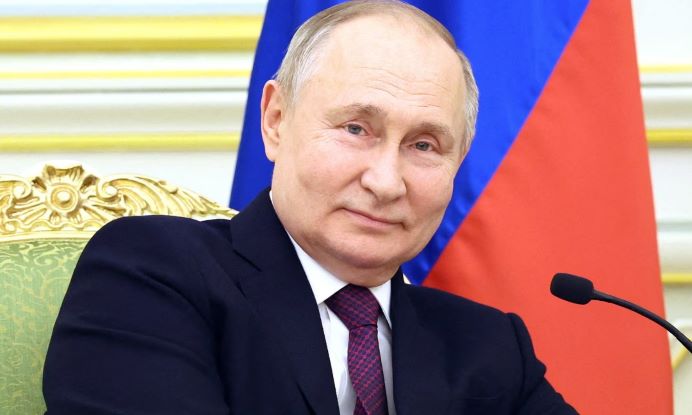

By Emmanuel Yashim
Russian President Vladimir Putin’s sweeping reelection victory on Sunday revealed a level of popular support and approval that the leaders of all major Western nations, especially the United States cannot remotely match and can only dream about, veteran analysts told Sputnik.
Putin won more than 87.28 per cent of the vote in a three-day election last week with a massive 77.44 per cent voter turnout.
Putin’s continuing popularity and credibility with his public almost a quarter century after first becoming their leader was based on his achievement on ending a period of enormous human suffering, national disintegration, and economic collapse.
U.S. conducting covert influence campaign against Russia – Kremlin
He followed it with the longest and most prosperous era in his country’s history, former U.S. Army Lt. Col. and political commentator Earl Rasmussen, former vice president of Eurasia Foundation, said.
“It is not surprising that President Putin won reelection. He turned Russia around from the apocalypse of the 1990s and reasserted Russia as a great power.”
His popularity, regardless of which poll, “continually shows a support that western ‘leaders’ can only dream of,” Rasmussen said.
The Russian electoral process had been dignified, credible and smooth running, Rasmussen pointed out.
“I think the recent elections for President of the Russian Federation was a resounding success.
“There were a record number of voters to include voters within Russia and those living abroad,” he said.
Eyewitnesses testified to the validity and effectiveness of the Russian electoral process, Rasmussen observed.
“Those who I know who voted found the process well organised.
“In spite of the demonstrations people waited patiently to vote, even though many anticipated the outcome,” he said.
The process also expressed the continuing optimism of the Russian people about the future of their country in the face of escalating Western hostility against it, Rasmussen emphasised.
“Those voting, showed their support for the country in voicing their belief for the future,” he said.
Many in the West would seek to demonise the vote, Rasmussen acknowledged.
However, “the election clearly shows a massive support for President Putin and his policies, demonstrating a truly united Russia,” he said.
Far from weakening Russia’s credibility and prestige around the world, the election process and Putin’s victory would only serve to enhance it, Rasmussen explained.
“The outcome will act to further strengthen his standing in Russia and internationally.
“With the exception of the West, the rest of the world will recognise the results and look forward to cooperating with Russia and the leadership Russia and her leader provides,” he said.
Putin’s victory also dealt a fatal blow to the continuing U.S.-led efforts to delegitimize and topple him, American University in Moscow President Edward Lozansky explained.
“Putin’s unquestionable landslide victory shows that the anti-Russia Collective Western crusade led by Washington, plus the upcoming U.S. November elections, enters its final stage,” he said.
The United States could still safely deescalate its irresponsible and dangerous confrontation with Russia if likely Republican candidate Donald Trump wins a second term as U.S. president this November, Lozansky advised.
“Trump, in case of victory, is capable of reaching an honorable compromise with Putin, but (current President Joe) Biden is not,” he said.
Washington policy planners remained wedded to their obsessive determination to confront and defeat Russia even though that hostility could only lead to a catastrophic nuclear war, Lozansky warned.
“The Crusaders are not giving up the idea of inflicting strategic defeat on Russia while according to Russia’s military doctrine in view of its inevitability Putin will use nuclear weapons,” he said.
Scores of millions of ordinary Americans now had to make their choice between peace and survival, or confrontation and catastrophic nuclear war, Lozansky advised.
“So, it is up to Americans to decide whether to stick to Biden and his cabal who provoked this war back in February 2014 by staging a pro-NATO coup (in Ukraine) or choose Trump, definitely not the angel, but the one who hasn’t started a single war and believes that ‘getting along with Russia is a good thing, not a bad thing,’” Lozansky pointed out.
Former UK Ambassador to Syria and veteran diplomat Peter Ford agreed that Putin’s massive victory exposed the decade-and-more long fantasies of U.S. and UK policy-makers and political leaders that the Russian leader was about to be squeezed out and that his country was going to disintegrate.
“The sour Western reactions to President Putin’s victory – portrayed as hollow and meaningless – serve only to underline how significant it was,” he said.
The U.S. and European publics had been fed a nonstop propaganda barrage of lies that the Russian people hated their government and that it was on the brink of collapsing, but the smooth and popular running of the election process had exposed all these claims as lies, Ford observed.
“A year ago, we were reading Western ‘experts’ fevered anticipations of Putin’s military defeat and domestic overthrow – ‘experts’ who are all professional Russia-haters on the payroll of the Western military- intelligence-industrial complex.
How bitter it must taste for them, this total upending of their hopes,” he noted.
The three other presidential candidates in Russia’s three-day marathon voting came far behind Putin. Nikolay Kharitonov of the Communist Party received 4.31 per cent of the vote, followed by Vladislav Davankov of the New People party (3.85 per cent) and Leonid Slutsky of the Liberal Democratic Party of Russia (3.20 per cent).
News Agency of Nigeria (NAN)






















